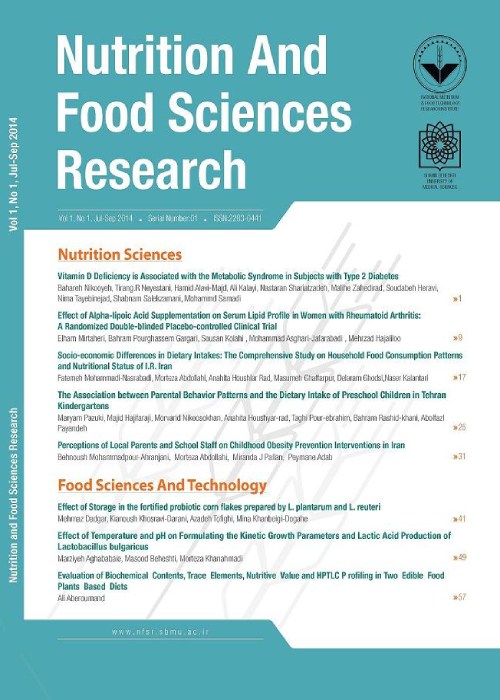Food Habits, Weight Status and Metabolic Risk Factors in a Group of Adults in Tehran
This study was carried out to assess food habits and their associations with weight status and metabolic risk factors in adults in Tehran, Capital of Iran.
A cross-sectional survey was conducted in a sample of adults (n=227) over 18 years old residing in Tehran. Demographic, anthropometric and food frequency questionnaires were filled out for all of the participants. Food habits were recorded using dietary habit questionnaires. Serum concentrations of glucose and lipids (total cholesterol [TC], triglycerides [TG] and high-density lipoprotein-cholesterol [HDL-C]) were analyzed from fasting blood samples.
The mean body mass index (BMI) was 28.52 kg/m2 and a minority of the participants (22.2%) had normal BMI. The participants rarely used table salt, fast food and crispy foods, dined at restaurants and had two snacks, three or more meals a day, five or more breakfast episodes a week and regular meals. They used vegetable oils for cooking and frying and/or cooking oil for frying. Drivers (p < 0.001) and less educated participants (p= 0.012) were susceptible to overweight. Positive associations were found between the BMI and the participant age (rs =0.28, p<0.001) and serum glucose (rs = 0.22, p =0.005), TG (rs = 0.34, p< 0.001) and TC (rs = 0.36, p < 0.001). Participants with normal weights had regular meals
(p= 0.034) and frequent snacks (p = 0.048). Overweight and obese participants had a higher rate of dyslipidemia (serum TG ≥ 150 mg/dL), compared to that of the normal weight participants (18.0 and 35.0% vs.7.9%, p=0.004).
The present participants had relatively healthy food habits, except for the order of meals and saturated fat consumptions. This study confirms the associations between overweight/obesity and dyslipidemia. Nutrition education with emphases on regular meals and frequent snacks (as protective habits against obesity) is recommended, especially for susceptible groups.
- حق عضویت دریافتی صرف حمایت از نشریات عضو و نگهداری، تکمیل و توسعه مگیران میشود.
- پرداخت حق اشتراک و دانلود مقالات اجازه بازنشر آن در سایر رسانههای چاپی و دیجیتال را به کاربر نمیدهد.



